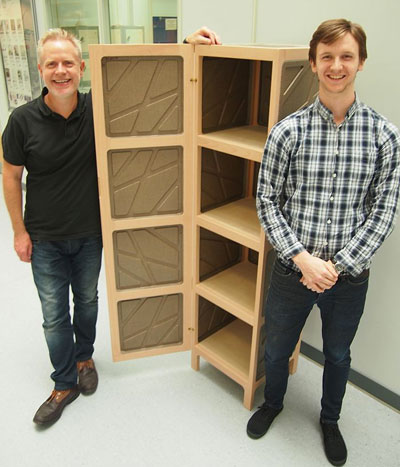| Sep 10, 2013 |
Furniture from biodegradable material can be composted at end of its lifespan
|
|
(Nanowerk News) A furniture design academic from Sheffield Hallam University has started creating furniture made from 100 per cent biodegradable material, which can be composted at the end of its lifespan.
|
|
Roger Bateman, senior lecturer in furniture design at the University, spent a year working with student Matt Harding on the Biofurniture project, which aims to make production of 100 per cent biodegradable furniture easier. The project, in collaboration with Netcomposites in Chesterfield, started as a study into whether plant-based material could be used to make furniture components, instead of petrochemical-based plastics.
|
|
The resulting product is made entirely from flax and a natural plastic derived from maize, and will eventually decompose.
|
 |
| Roger Bateman, senior lecturer in furniture design at Sheffield Hallam, with student Matt Harding.
|
|
Roger said: "Sustainable furniture designs have so far focused on using recyclable materials, so that when the product reaches the end of its lifespan it can be recycled and made into other products.
|
|
Roger worked with Chesterfield-based composite materials company Netcomposites to exploit a fabric made from flax and the plant-based polymer PLA. He then started designing furniture products that use the material as structural, lightweight panel components that replace less environmentally-friendly, man-made boards, such as MDF or chipboard.
|
|
Roger said: "I found that manufacturers are generally warming to the idea of bio products, but the key principles of simple, honest, quality design must still be applied.
|
|
"It's also very important that the benefits of using bioplastics are communicated clearly to the consumer."
|
|
The resulting designs created by Roger Bateman and Matt Harding will be shown during the London Design Festival 2013, held from 14 to 22 September.
|

